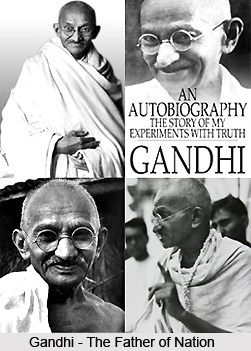 Gandhi dedicated his life to the wider purpose of discovering truth, or Satya. He tried to achieve this by learning from his own mistakes and conducting experiments on himself. Gandhi summarized his beliefs first when he said "God is Truth".
Gandhi dedicated his life to the wider purpose of discovering truth, or Satya. He tried to achieve this by learning from his own mistakes and conducting experiments on himself. Gandhi summarized his beliefs first when he said "God is Truth".
"NonViolence"- The concept of nonviolence (ahimsa) and nonresistance has a long history in Indian religious thought. "Vegetarianism"- The idea is deeply engrained in Hindu and Jain traditions in India. Before leaving for his studies in London, Gandhi made a promise to his mother, Putlibai and his uncle, Becharji Swami that he would abstain from eating meat, taking alcohol, and engaging in promiscuity. He wrote the book `The Moral Basis of Vegetarianism` and several articles on the subject. "Brahmacharya"-
Gandhi saw brahmacharya as a means of going close to God and as a primary foundation for self realization. "Simplicity"- Gandhi earnestly believed that a person involved in social service should lead a simple life which he thought could lead to Brahmacharya. Gandhi was born a Hindu and practised Hinduism all his life. Most of his principles were derived from Hinduism. As a common Hindu, he believed all religions to be equal, and rejected all efforts to convert him to a different faith.
This prolific writer for decades he edited several newspapers including "Harijan" in Gujarati, Hindi and English, "Indian Opinion" while in South Africa and, "Young India" in English, and `Navajivan`, a Gujarati monthly, on his return to India. Later Navajivan was also published in Hindi. In addition, he wrote letters almost every day to individuals and newspapers. Gandhi has also written a few books including his autobiography, "An Autobiography or My Experiments with Truth", "Satyagrapha in South Africa" about his struggle there, "Hind Swaraj" or Indian Home Rule, a political pamphlet, and a paraphrase in Gujarati of John Ruskin`s Unto This Last. This last essay can be considered his program on economics. He also wrote extensively on vegetarianism, diet and health, religion, social reforms, etc.
Gandhi usually wrote in Gujarati, though he also revised the Hindi and English translations of his books. The Indian Government have published Gandhi`s complete works under the name of "The Collected Works of Mahatma Gandhi" in the 1960s. The writings comprise about 50,000 pages published in about a hundred volumes. Several biographers have undertaken the task of describing Gandhi`s life. Among them, two works stand out: D. G. Tendulkar with his "Mahatma"and "Life of Mohandas Karamchand Gandhi" in 8 volumes, and Pyarelal and Sushila Nayar with their "Mahatma Gandhi" in 10 volumes.
The noted civil right movement leader in the United States, Martin Luther King was one of the influenced person by Gandhian principles of non-violence. Anti-apartheid activist and former President of South Africa, Nelson Mandela, was also inspired by Gandhi. Others include,Khan Abdul Ghaffar Khan, Steve Biko, and Aung San Suu Kyi. The British musician, John Lennon, also referred to Gandhi when discussing his views on non-violence. Former U.S Vice-President and environmentalist, Al Gore spoke of Gandhi`s influence on him. In Europe, Romain Rolland first advertised the struggle of the Mahatma with his book "Mahatma Gandhi".
Lanza del Vasto went to India in 1936 in the aim to live with Gandhi, later decided to come back to Europe to spread Gandhi`s philosophy. Gandhi`s life and teachings inspired many who have specifically referred to Gandhi as their mentor, or dedicated their life to spreading Gandhi`s ideas. Gandhi`s birthday, October 2, is a national holiday in India, Gandhi Jayanti. On 15 June 2007, it was announced that the "United Nations General Assembly" has "unanimously adopted" a resolution which has declared October 2 to be "the International Day of Non-Violence." `Time Magazine` named Gandhi `the Man of the Year` in 1930, Albert Einstein showed his honor with the title "Person of the Century" at the end of 1999, and named The Dalai Lama, Lech Walesa, Dr. Martin Luther King, Jr., Cesar Chavez, Aung San Suu Kyi, Benigno Aquino, Jr., Desmond Tutu, and Nelson Mandela as Children of Gandhi and his spiritual heirs to non-violence. The Government of India awards the annual Mahatma Gandhi Peace Prize to distinguished social workers, world leaders and citizens. Nelson Mandela, the leader of South Africa`s struggle to eradicate racial discrimination and segregation, is a prominent non-Indian recipient.






